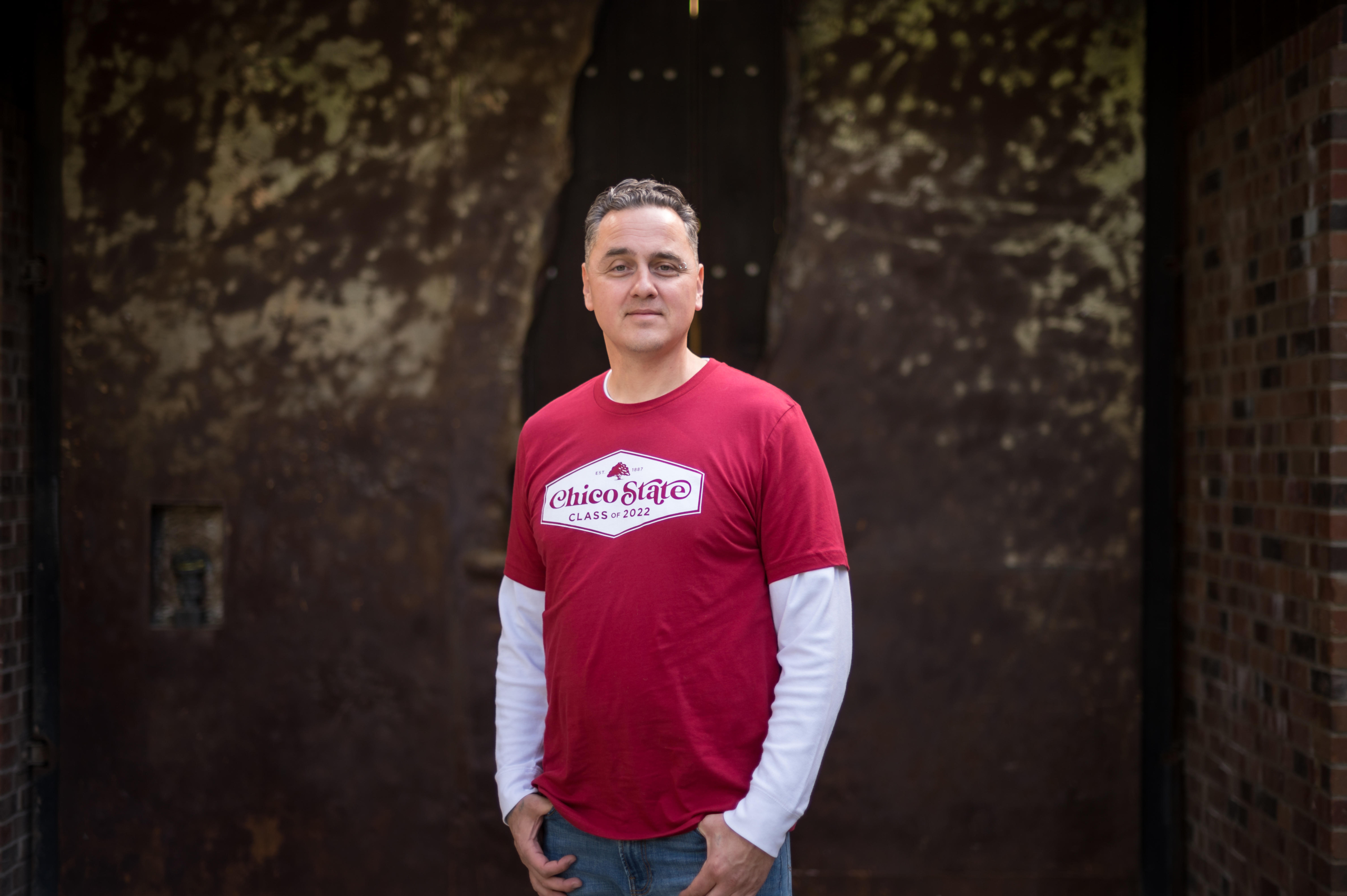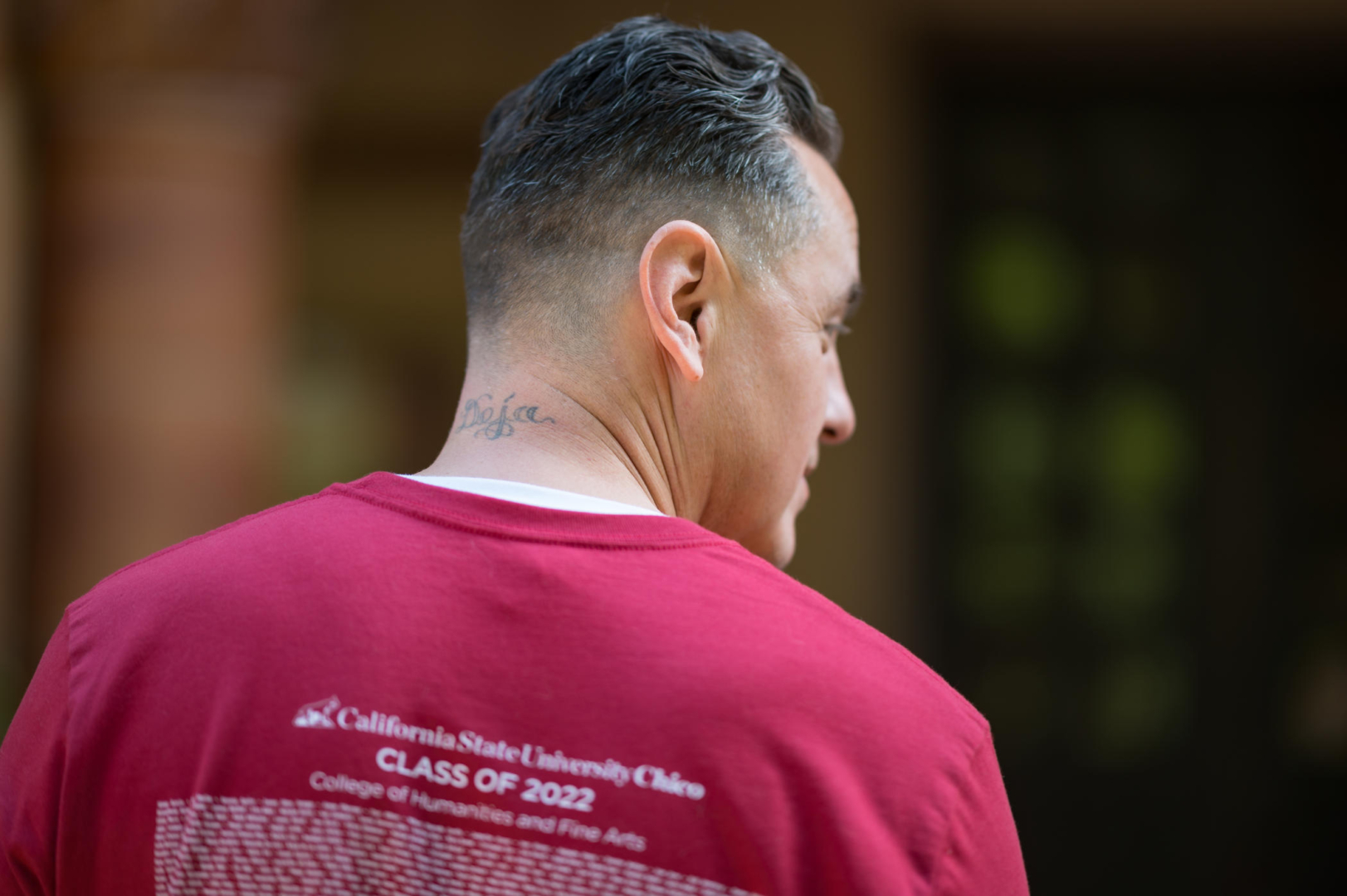From Gang Life to College Graduate: Humanities Major Aspires to Help Incarcerated Students

Benito Gutierrez is a formerly incarcerated individual and was awarded first place in fiction in the PEN 2017 Prison Writing contest and recipient of the Rawlins award this year. He is an outstanding senior, photographed on Thursday, April 28, 2022 in Chico, Calif. (Jason Halley/University Photographer/Chico State)
A former drug dealer and a criminal, Benny Gutierrez admits his cruises through Chico State’s tree-lined campus growing up were often on his way to do business or evading law enforcement, in between stints in juvenile hall, group homes, jail, and eventually prison. Growing up with zero guidance and bad influences, suffice to say, a college education was not on his radar.
When he makes his way to University Stadium later this month, he’ll be walking in with confidence as he graduates with his bachelor’s degree in humanities and considerations to pursue a master’s, while also holding tightly to a dream of furthering a program he started to support students who have a connection to incarceration.
“I’ve had less for a long time,” he said. “I want something more.”
Incarcerated for most of his adult life until the age of 42, Gutierrez started to reconsider his path while looking around at his fellow inmates during his last stint in prison.
“I was playing out the tape for the rest of my life if I continued doing what I was doing, and it didn’t look good,” he said. “I felt like my life was worth more than that, and that I could do something positive and effect change.”
Gutierrez started attending self-help groups during his time in prison and processing his traumas, including the murders of his sister when he was 3 years old and his brother when he was 12. And he started taking classes at Merced College through a prison education program. It wasn’t long before he was nominated for and won Outstanding Student of the Month—not just within his correctional cohort but all students at the community college. He was also awarded first place in fiction in the PEN America 2017 Prison Writing Contest and submitted a short film to the Pembroke Taparelli Arts & Film Festival that same year.
“I thought, ‘I’m good at this, and people are noticing,’” he said. “When I came home that time, I left all the gang stuff behind.”
Released on parole, Gutierrez started reflecting on how his life choices had not only stunted his own opportunities but deeply damaged his community, “like a pebble in a still pond,” he said. He wanted to make amends.
“I do regret the trauma I caused other human beings but I don’t want to chalk up my experience as a loss,” he said. “I can use it for good.”
He decided to start by attending Butte College, even though no one else in his family or social circles knew the first thing about higher education.
“I couldn’t fill out a FAFSA from a DMV form but I did it. I sat down and figured it out,” he said.
Gutierrez was soon excelling in his classes, and he started a program at Butte College for formerly incarcerated students, Ascending Scholars, to provide a network of guidance and support in their pursuit of a degree.
In spring 2020, he earned his associate’s degree with honors and set his sights on Chico State. With a deep love of learning, he persisted through his first two semesters of virtual learning by connecting directly with his faculty and engaging in meaningful ways with the coursework. There were many times when he was one of only a handful of students to turn on their cameras in class, but he enjoyed having rich discussions on everything from comparative religion to world cultures to classic literature. He soon declared a major in humanities.
Reflecting on the Ascending Scholars, he decided to start a similar club for Chico State students. Gutierrez wrote a constitution and bylaws, found several faculty who were willing to be advisors, and recruited student members.
Rebound Scholars is open to formerly incarcerated students and justice-impacted students. Whether someone has spent a day in jail, juvenile hall, prison, or immigration detention—or had a loved one with that experience—all are welcome, including anyone interested in reform and social justice.
Gutierrez said the program creates community and support, and he hopes it will one day have programmatic investment like the Dream Center or PATH Scholars Program, with dedicated space and staffing, funds for laptop loans and textbooks, and other resources.
“Here’s the thing about formerly incarcerated students,” he said. “We try really hard. We don’t complain a lot because we are used to worse circumstances. The people in my club, they are all badasses. They are double majoring and becoming lawyers and so successful with their studies.”
Gutierrez himself has maintained a rich level of involvement, serving as a student ambassador for the College of Humanities and Fine Arts, sitting on the Institutional Review Board, and earning Humanities Major of the Year honors. He also has been working with Admissions to share his experience as a nontraditional returning student, and he has taken courses in museum studies, with an eye toward political art exhibition.
After the 2020 murder of George Floyd, he partnered with a peer from Butte College to put on a Black Lives Matter art show, raising $2,000 for the civil rights advocacy nonprofit Color of Change. The experience sparked an interest in art curation, and he now is the sole curator of Greenhouse Studio, a community gallery in Chico that elevates the work of local artists who are involved in activism, including a Prisoner Art Show at Arc Pavilion and Art in Corrections at the 1078 Gallery. He’s also excited for an installation that opened this week in the Bell Memorial Union, where all the artwork is by current and formerly incarcerated artists and system-impacted students.
“I cannot speak loudly enough about how important these efforts have been for our community, in using art to push for social change and to create spaces of community and solidarity,” said Laura Nice, professor of comparative religion and humanities and director of the Janet Turner Print Museum. “Since the start of the pandemic, many nonprofit arts organizations have closed, making this work is even more vital.”
Gutierrez said he has been struck by the incredible support he has received from faculty like Nice, his major advisor Jed Wyrick, and others. He typically doesn’t share details of his background until he gets to know his professors better, wanting to be judged on his academic merit rather than his criminal history, but when he does open up, he’s found people to be incredibly supportive and enthusiastic of his goals.
For Nice, who has taught him in two classes, it was immediately apparent how exemplary Gutierrez is in connecting his classroom learning with his passion to make a difference through arts in the community. He has been invited as an undergraduate to take graduate-level courses, and recently took a leadership role to facilitate a small student conversation with Book in Common author Tommy Orange.
“His life experiences and unique path to higher education have combined to make him a truly singular leader and advocate in our community and on campus,” Nice said.
Wyrick, who nominated him for the Lt. Rawlins Merit Award—one of the most prestigious scholarships at the University—describes him as a consummate engaged student, generous class participant, and stellar writer and reader who was thoughtful and thought-provoking in his interactions inside and outside of class.
“Benito is among the most thoughtfully forward-thinking students I have had the pleasure working with in my years at Chico State,” Wyrick said. “I firmly believe that he has only just begun to show his humanity to the world.”

As he prepares to graduate, Gutierrez says his most meaningful accomplishment is how proud his family is of him. His dad, a Vietnam veteran and “old-school Chicano” who didn’t see the value in his son getting an education in the humanities, regularly attends his art shows and events where Gutierrez has been presented as a guest speaker.
“[My family] knew me as one way—as the cousin they didn’t want coming over to the house because the cops might soon follow,” he said. “Now, they’re all asking for my help to get into college. I love my life.”
As he humbly marvels at how he’s set himself up for a future that’s so markedly different than the path he was on decades ago, Gutierrez encourages other students from troubled backgrounds to not give up.
“Feel like you belong—because you do. You can’t let anybody tell you otherwise,” he said. “Don’t feel intimidated. You’ve been through adversity of other kinds. You can do this.”


